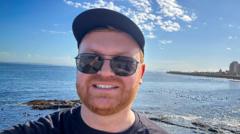A recent surge of discussions has erupted following the arrival of a group of 59 Afrikaners in the United States seeking refuge, spurred by claims of persecution advocated by figures like Donald Trump and Elon Musk. However, many voices within the Afrikaner community, including social media influencer Ulrich Janse van Vuuren, strongly reject the notion that they are refugees fleeing a genocidal threat.
Do Afrikaners Embrace Trump’s Refugee Offer? Perspectives from the Ground

Do Afrikaners Embrace Trump’s Refugee Offer? Perspectives from the Ground
Amid the discourse around South African Afrikaners considering resettlement in the US, voices emerge championing the homeland.
Janse van Vuuren, who boasts over a million followers online, vocally asserts his commitment to South Africa, emphasizing his pride in his heritage and his desire to contribute positively to the nation’s future. “South Africa is my home,” he emphasizes, labeling the departing group as “opportunists” rather than genuine refugees. He highlights the disparity in living standards between racial communities, asserting that white Afrikaners continue to enjoy privileges in a country that has made strides towards equality since the end of apartheid.
As the discourse evolves, some Afrikaners voice their frustrations towards government policies addressing historical inequalities, like the controversial land expropriation without compensation law. These government changes evoke fears amongst certain Afrikaners regarding their economic stability. However, many community leaders and members, including organizations such as AfriForum, stress their resolve to remain and work towards solutions within South Africa, countering claims of mass exodus as being exaggerated.
Amid polarized sentiments, one farmer’s family, led by Ilse Steenkamp, has applied for refugee status following a personal crisis involving land invasion. While her experiences reflect serious grievances, many argue that systemic persecution does not exist at the national level. Political analysts like Dr. Piet Croucamp suggest those who choose to leave may constitute a small, opportunistic group rather than a representation of the Afrikaner community.
With the US Embassy clarifying criteria for refugee applications, and more Afrikaners voicing their intent to stay, the narrative around Afrikaners and Trump’s refugee offer continues to unfold, revealing a community divided on its future yet united in its identity.
As South Africa grapples with the complexities of its racial dynamics, the narrative of its Afrikaner population remains a poignant and evolving chapter in the broader societal dialogue.
As the discourse evolves, some Afrikaners voice their frustrations towards government policies addressing historical inequalities, like the controversial land expropriation without compensation law. These government changes evoke fears amongst certain Afrikaners regarding their economic stability. However, many community leaders and members, including organizations such as AfriForum, stress their resolve to remain and work towards solutions within South Africa, countering claims of mass exodus as being exaggerated.
Amid polarized sentiments, one farmer’s family, led by Ilse Steenkamp, has applied for refugee status following a personal crisis involving land invasion. While her experiences reflect serious grievances, many argue that systemic persecution does not exist at the national level. Political analysts like Dr. Piet Croucamp suggest those who choose to leave may constitute a small, opportunistic group rather than a representation of the Afrikaner community.
With the US Embassy clarifying criteria for refugee applications, and more Afrikaners voicing their intent to stay, the narrative around Afrikaners and Trump’s refugee offer continues to unfold, revealing a community divided on its future yet united in its identity.
As South Africa grapples with the complexities of its racial dynamics, the narrative of its Afrikaner population remains a poignant and evolving chapter in the broader societal dialogue.


















